By visiting our site, you agree to our privacy policy regarding cookies, tracking statistics, etc.
Today’s guests crave exceptional dining experiences––and that begins with a prepared, well-trained team. However, with 45% of operators reporting they need more staff to meet demand, finding and retaining talented employees is easier said than done.
Here’s where restaurant training comes in. Whether onboarding or upskilling a barista, server, or line cook, creating a training regimen that is engaging, structured, and consistent will lead to an exceptional team that drives positive reviews, repeat business, and a stronger bottom line.
Use this guide as a blueprint for developing a highly skilled workplace where employees feel valued and empowered to grow.
In an industry where the average employee tenure is a fleeting 56 days, simply hiring warm bodies is a recipe for disaster. To thrive as a restaurant, you need the support of trained professionals who not only understand your vision but also have the skills and tools to execute it flawlessly.
Restaurants with robust training programs typically have:

Tired of inconsistent service and rookie mistakes? A well-crafted training manual is your playbook for success. Follow these steps:
In addition, operators can elevate their training manual by embracing technology. For example, a digital-first employee platform allows for easy access, real-time updates and interactive elements that make learning more engaging and effective. It also enables you to set training materials in different languages, ensuring all employees, regardless of their native language, can fully understand and follow procedures.
The best part is that a digital format is scalable, perfect for growing teams, and eliminates the hassle of updating and distributing physical copies, helping maintain consistency across all locations.
These platforms also make tracking performance quick and simple with built-in analytics, allowing you to monitor progress, completion rates, and quiz scores in real-time. This way, you can identify areas for improvement and ensure your team is consistently performing at its best.
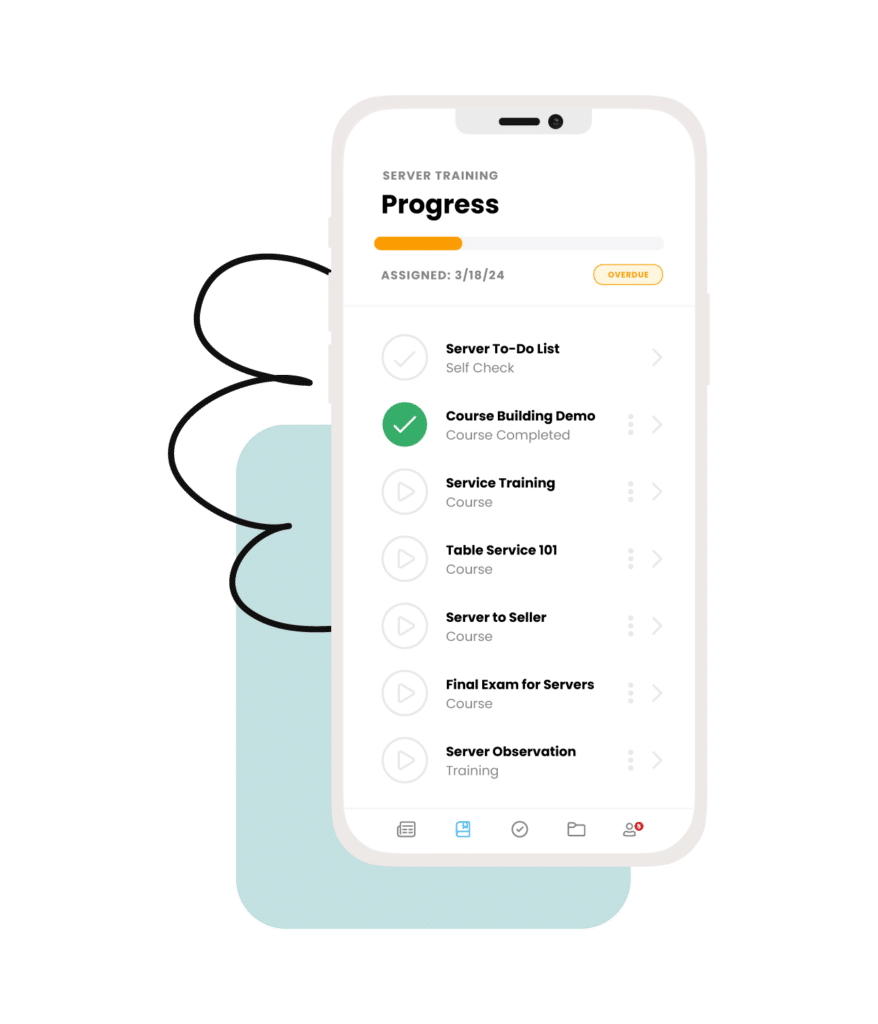
Whether it’s handling a disgruntled guest, a sudden rush of reservations, or a kitchen mishap that threatens to derail service, a restaurant manager is the person who keeps the ship afloat.
A restaurant management course is essential for creating leaders who can handle any challenge with confidence and finesse.
Servers aren’t just order-takers. They’re the human touch that transforms a meal into an experience and leaves guests raving and eager to return long after the last bite.

In fine dining, service transcends mere efficiency. To excel, servers need more than basic training. They should be masters of personalized attention.
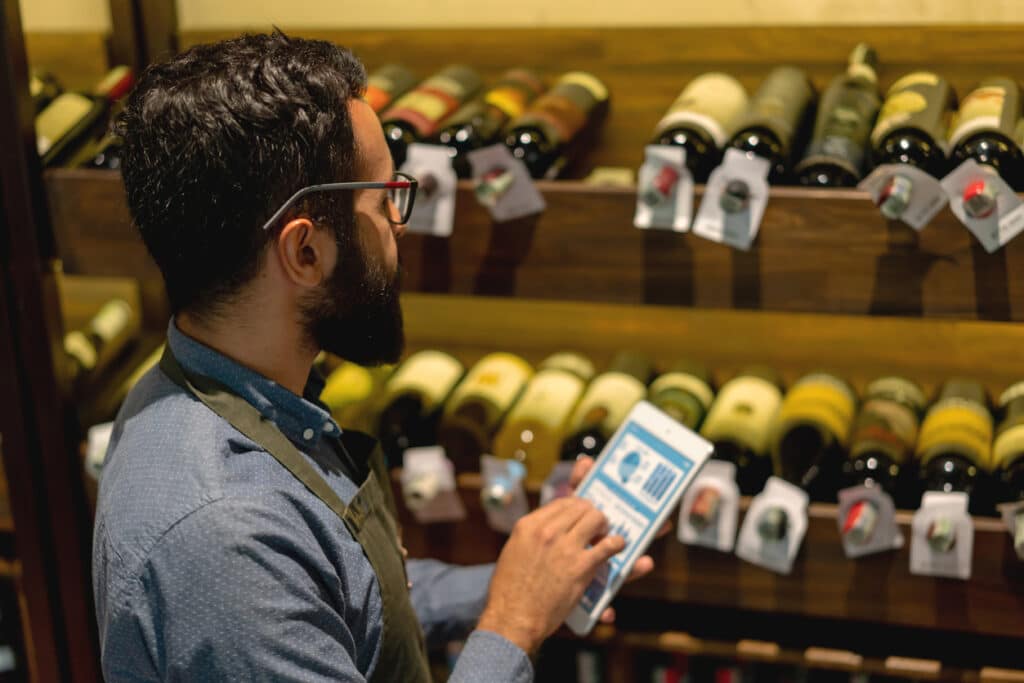
What pairs better with your fresh seafood platter: a crisp Sauvignon Blanc or a buttery Chardonnay? A server with sommelier-level expertise can confidently guide guests through these decisions.
Kitchen staff is the heart of any restaurant. From the precise slicing of a prep cook to the final flourish from a chef, their skills and knowledge directly impact the quality of your food, the efficiency of your operations, and the satisfaction of your guests.
An effective chef training program encompasses more than mastering recipes and techniques. It should focus on developing leadership skills, fostering creativity, and problem-solving.
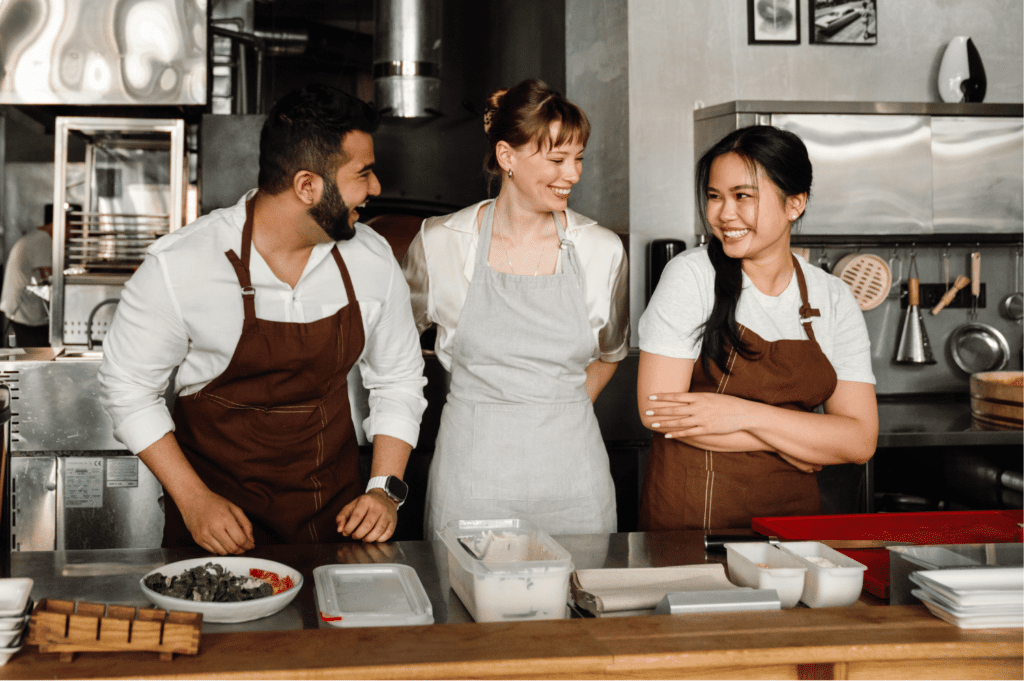
A sous chef is the chef’s trusted sidekick. Effective training equips them with the skills and knowledge to oversee daily operations, control quality, and maintain a smooth workflow in the kitchen.
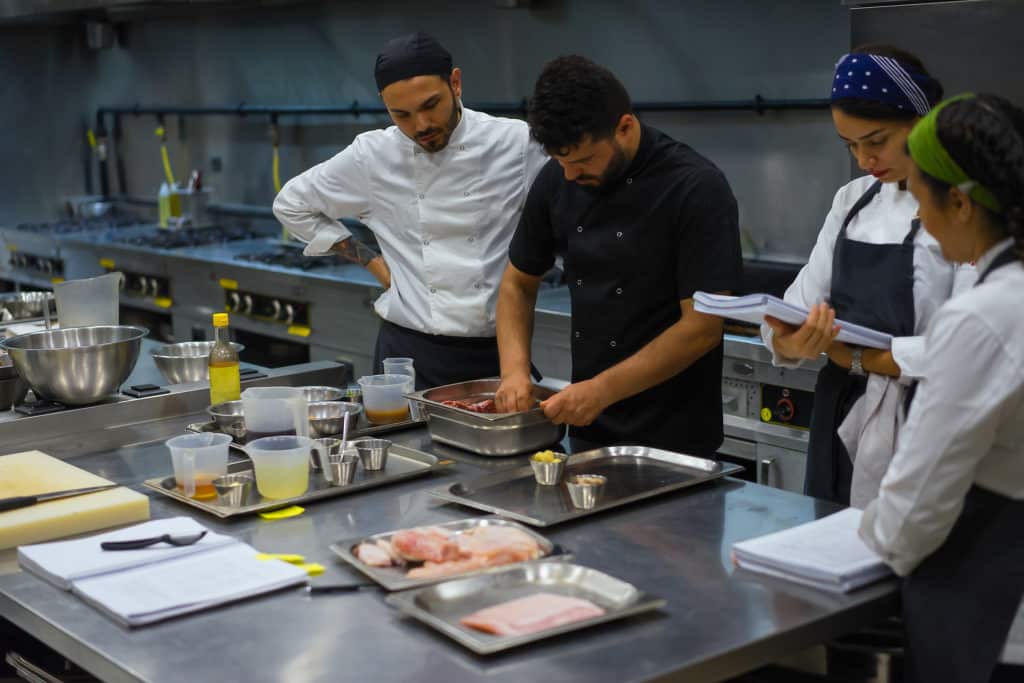
Cooks are the essential workforce of your kitchen, responsible for preparing and cooking dishes according to the chef’s instructions.
Running a diner or cafe? Short order cook training should focus on quick execution, multitasking, and maintaining quality under pressure.
This means teaching them how to memorize orders and execute them flawlessly, especially during peak hours when orders are flying in. They must learn how to prioritize tasks, maintain a smooth workflow, and know how to efficiently use equipment and space, from grills and fryers to microwaves and ovens.
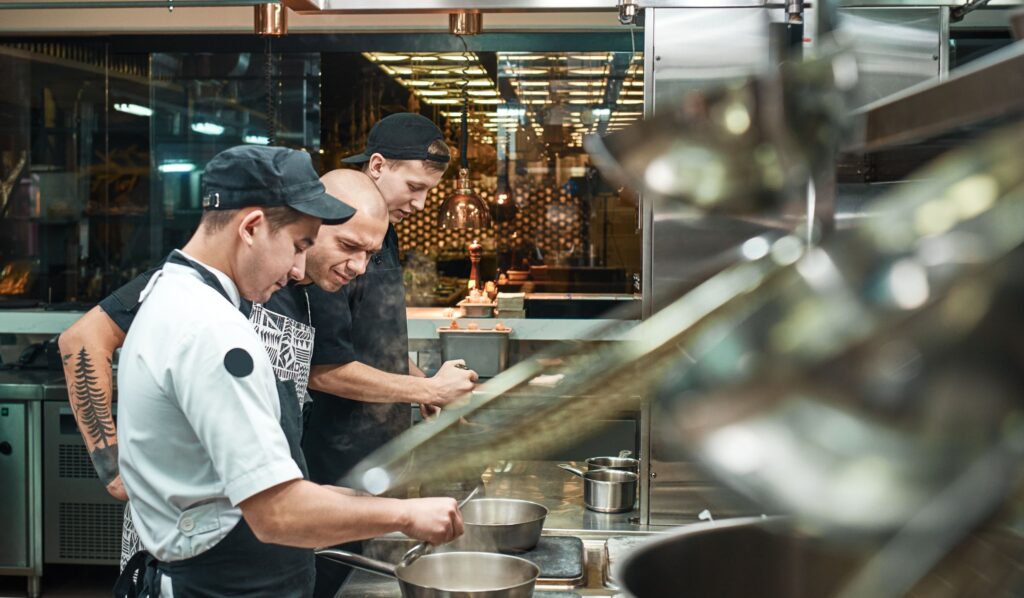
Line cooks are the specialists in the kitchen. To help them excel in their designated role—whether it’s the grill, sauté, or fry station—train them how to manage their time and resources effectively. This might mean teaching them how to read and interpret tickets accurately so they know how to prioritize orders.
Additionally, emphasize the importance of maintaining consistent quality and presentation, even under pressure. Every dish should meet your restaurant’s standards.
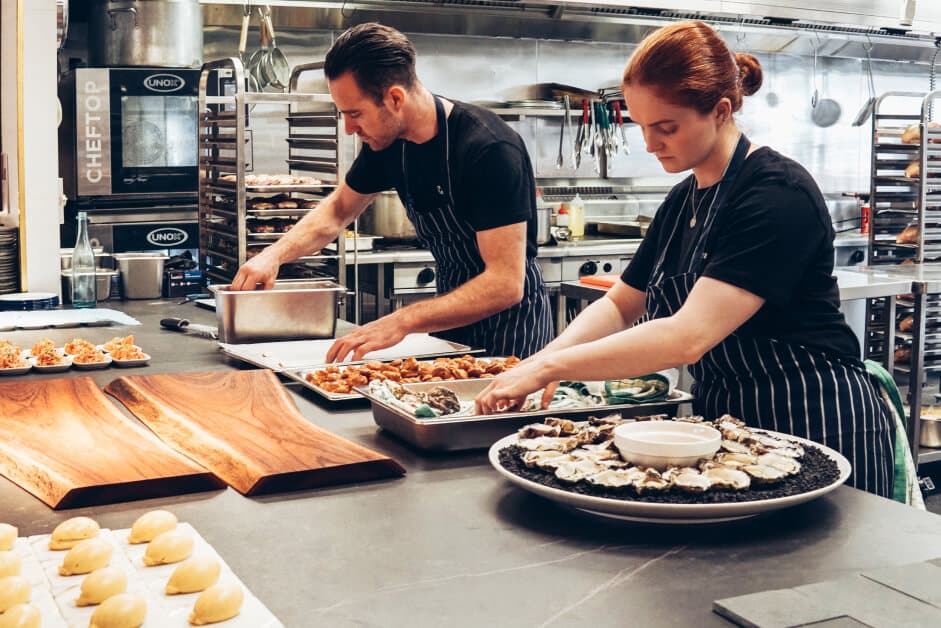
Prep cooks are the backbone of the restaurant, responsible for the behind-the-scenes work that ensures smooth sailing during service.
Dishwashers play a leading role in maintaining a clean kitchen environment. Focus their training on proper dishwashing techniques, including scraping, pre-rinsing, washing, sanitizing, and drying. This can help them understand the importance of each step in preventing cross-contamination.
Waste management is important as well. This involves proper waste disposal and recycling practices to minimize environmental impact and maintain a safe and clean workspace.
Forget secret recipes and fancy decor. Exceptional customer service is key, yet 70% of restaurant workers never get customer service training. By leveling up your servers, you’re not just teaching them how to serve—you’re empowering them to create dining experiences that keep your guests coming back for more.
Restaurant hosts set the tone for the entire meal, creating an inviting atmosphere and maintaining a smooth and efficient flow from the moment guests arrive until they depart.

Cashiers are often the last point of contact for guests. Focus cashier training on quick and accurate payment processing, from handling cash and credit cards to applying discounts or promotions. This helps minimize wait times and maintain a smooth flow of guests.
Additionally, teach them to interact with guests in a friendly and professional manner, answering questions, addressing concerns, and resolving any issues that may arise.
Fast food restaurants run on speed, consistency, and efficiency. When the lunch rush hits or the drive-thru line backs up, a well-trained team can make all the difference between satisfied customers and frustrated ones. In an industry where every second counts, staff need to be trained to deliver quick service without compromising quality or safety.

A well-trained bar team is the key to keeping things running smoothly, even on the busiest nights. With the right skills, bartenders can serve great drinks, engage with guests, and keep the energy flowing.
A great bar manager does more than just oversee operations—they set the tone for the entire team and keep everything running like a well-oiled machine. Training them to juggle people, product, and profits is essential for long-term success.

Certified bartenders bring more to the table than just mixing drinks—they offer expertise, confidence, and professionalism that can elevate any bar’s reputation. Proper training ensures they’re not just pouring cocktails but creating memorable experiences.
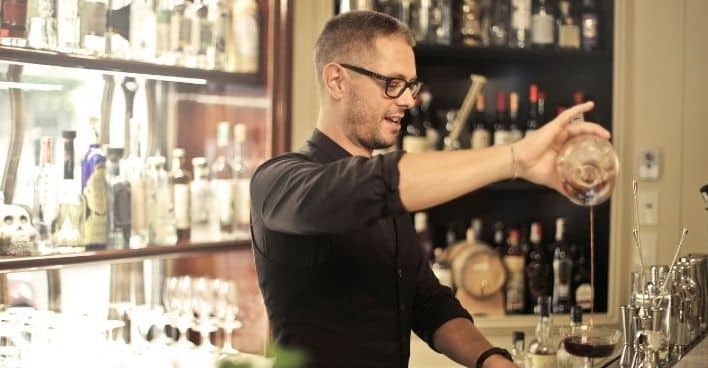
Barbacks work behind-the-scenes to keep the bar running smoothly, especially on packed nights. Good training teaches them to stay a step ahead—restocking bottles, grabbing glassware, and clearing clutter before anyone notices. They also pick up basic bartending skills, like pouring beers or prepping garnishes, so they can jump in when things get hectic.
It’s a fast-paced, physical job, so barbacks learn how to hustle while staying coordinated with the bartenders. They also get the rundown on bar safety, sanitation, and proper storage to keep everything running clean and smooth. With solid training, a great barback becomes the glue that holds the team together and keeps the drinks flowing without a hitch.
Food runners and bussers are essential to the dining experience, acting as the bridge between the kitchen and the guests. Training focuses on honing their speed and communication skills, ensuring they can swiftly deliver dishes and drinks to the right tables while keeping an eye on guest needs.
They learn the menu inside and out, allowing them to answer questions and provide recommendations confidently. It’s also crucial for them to understand the importance of presentation—serving each dish with care to enhance the dining experience.
But it’s not just about speed—teamwork is key. Bussers must learn how to clear tables efficiently and set them up for the next guests, creating a clean and inviting atmosphere. With the right training, food runners and bussers become vital players in the restaurant, enhancing the overall experience for everyone who walks through the door.

A great coffee experience starts with skilled baristas who know their craft inside and out. Coffee barista training equips these passionate individuals with the knowledge and skills to create delicious brews and provide exceptional customer service.
Certifications play a crucial role in maintaining high standards and ensuring safety. These credentials not only demonstrate a commitment to excellence but also boost the credibility of the establishment.
Food safety certifications, like Always Food Safe, are crucial for ensuring that everyone understands the importance of proper food handling and sanitation. This not only protects customers from foodborne illnesses but also helps restaurants comply with health standards. Similarly, many places require bartenders and servers to have alcohol service certifications, which teach them responsible serving practices and local laws. This knowledge is key to creating a safe environment for everyone.
Customer service training certifications can take things a step further, focusing on essential skills like communication and problem-solving. When staff are trained to handle challenges with a positive attitude, it can make all the difference in customer satisfaction. For restaurant managers, specialized certifications help develop skills in leadership, financial management, and efficient operations, which contribute to a healthier work environment and overall success.
Lastly, certifications that focus on sustainability can guide restaurants toward eco-friendly practices, appealing to guests who care about the planet. This not only enhances the restaurant’s image but also helps reduce its environmental impact.
The National Restaurant Association’s ServSafe program is essential for anyone in the restaurant industry, focusing on food safety and responsible alcohol service. This training helps staff learn the ins and outs of safe food handling, sanitation, and how to prevent foodborne illnesses, which is crucial for keeping guests healthy and happy.
The program also covers responsible alcohol service, teaching staff to recognize signs of intoxication, understand the effects of alcohol, and adhere to local laws, creating a safer environment for everyone.
What makes this training especially appealing is its accessibility. With options for both online and in-person courses, it’s easy for teams to get involved. Investing in this training not only helps restaurants comply with health regulations but also fosters a culture of safety and professionalism that benefits both staff and guests.

RBS Certification, or Responsible Beverage Service Certification, is essential for anyone serving alcohol in restaurants and bars. This training focuses on promoting safe practices to prevent over-serving and underage drinking.
Participants learn to recognize signs of intoxication, understand the effects of alcohol, and handle difficult situations. With many courses available online, teams can easily complete their training at their own pace.
By earning RBS Certification, staff not only make better choices but also contribute to a safer, more enjoyable atmosphere for everyone.
The program also covers responsible alcohol service, teaching staff to recognize signs of intoxication, understand the effects of alcohol, and adhere to local laws, creating a safer environment for everyone.
What makes this training especially appealing is its accessibility. With options for both online and in-person courses, it’s easy for teams to get involved. Investing in this training not only helps restaurants comply with health regulations but also fosters a culture of safety and professionalism that benefits both staff and guests.
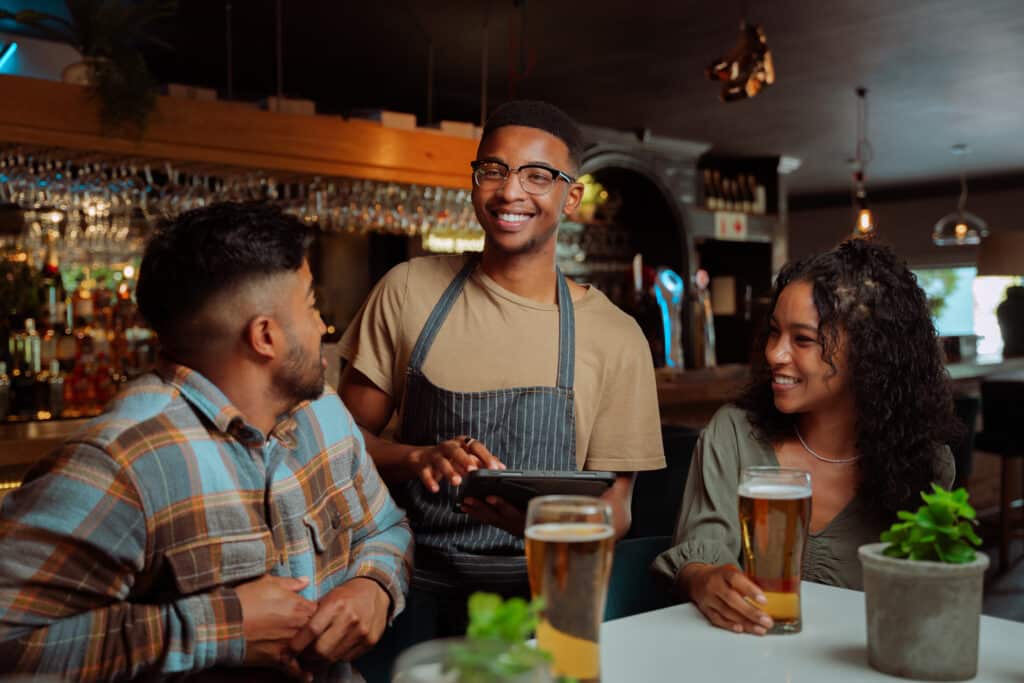
ABC Server Training helps restaurant staff learn how to serve alcohol responsibly. The program dives into important topics like state laws, spotting signs of intoxication, and managing tricky situations with ease.
Through interactive sessions, participants engage in real-world scenarios that build confidence and practical skills. The training goes beyond just following rules; it aims to create a fun and safe atmosphere for guests.
When staff complete ABC Server Training, they help foster a culture of responsibility, making every dining experience enjoyable for everyone.
An Alcohol Handler Permit is essential for restaurant staff who serve or sell alcohol. This permit ensures that employees understand the laws and best practices surrounding alcohol service, which helps create a safer environment for both patrons and staff.
The training typically covers topics like checking IDs, understanding intoxication levels, and handling difficult situations. It’s not just about compliance—it’s about promoting responsible alcohol service and enhancing the overall guest experience.
Having an Alcohol Handler Permit lets staff show they take their roles seriously, boosting the establishment’s reputation and ensuring guests feel safe and well cared for.

Wine Sommelier Certification is a fantastic opportunity for anyone eager to explore the world of wine more deeply. It’s all about learning the ins and outs of various wine regions, grape varieties, and how to pair wines with food, turning people into knowledgeable sommeliers ready to enhance any dining experience.
During training, individuals dive into wine tasting techniques, discover the best ways to store and serve wine, and learn how to recommend the perfect bottle to complement a guest’s meal. Having certified sommeliers on staff not only elevates a restaurant’s wine program but also creates a welcoming atmosphere where guests feel confident asking questions and trying new wines.
SCA Barista Certification is a comprehensive training program that focuses on all aspects of coffee preparation, from the bean to the brew, ensuring participants gain a deep understanding of the craft.
In the course, baristas learn about the origins of coffee, the various brewing methods, and the intricacies of espresso extraction. They’ll dive into the science behind milk frothing and latte art, allowing them to create visually stunning and delicious beverages. This certification also emphasizes customer service skills, enabling baristas to connect with customers and enhance their coffee experience.

TABC Alcohol Certification is a must for anyone planning to serve alcohol in Texas. This training helps bartenders, servers, and managers understand the ins and outs of responsible alcohol service. It dives into important topics like spotting fake IDs, knowing the effects of alcohol, and figuring out when to say no to a guest who may have had too much.
Through this program, participants learn about Texas alcohol laws and regulations, which are crucial for keeping everyone safe and compliant. Plus, it highlights the importance of customer service, teaching staff how to create a friendly atmosphere while also being mindful of alcohol consumption. Getting certified not only boosts staff skills but also ensures a better experience for everyone at the table.
Training your restaurant staff to upsell is all about creating a relaxed, welcoming atmosphere where guests feel appreciated. Start by ensuring your team knows the menu inside and out. When they understand the dishes and flavors, they can confidently suggest items that will truly enhance the dining experience.
Encourage your staff to engage with customers in friendly conversation. For example, if a guest orders a steak, they might say, “May I recommend a rich red wine to pair with that? Our Cabernet Sauvignon perfectly complements the flavors of the steak.” Simple, thoughtful suggestions like this can elevate the dining experience and make guests feel special.
Role-playing can be a fun way to build these skills. Set up practice sessions where team members can act out different scenarios, trying out various upselling techniques in a relaxed setting. This not only boosts their confidence but also helps them find their own unique style of connecting with guests.
Lastly, celebrate those who successfully upsell. Recognizing their efforts creates a positive culture and motivates everyone to engage more with guests. When your team feels empowered and informed, upselling becomes a natural part of their service, leading to happier guests and a more successful restaurant.

Training employees in food safety is essential for maintaining a safe and hygienic restaurant environment. Start with comprehensive onboarding that covers the basics, like proper handwashing techniques, food storage guidelines, and temperature control. Using interactive training methods, such as videos and quizzes, can make the learning process more engaging.
Regular refresher courses are vital too, keeping safety practices fresh in everyone’s minds. Encourage open discussions about food safety, where staff can share concerns or tips. Additionally, implementing a buddy system allows seasoned employees to mentor newcomers, reinforcing good practices. By fostering a culture of safety, everyone becomes invested in maintaining high standards, ensuring the well-being of both staff and customers.
Blog Menu
See why more than 40,000 restaurants use Restaurant365
Training restaurant staff is essential for delivering a great dining experience. By prioritizing comprehensive training in various areas, restaurants can empower their teams to excel. Incorporating digital training tools can streamline the learning process, making it easier for staff to access resources and stay updated on best practices. A well-prepared staff not only improves efficiency but also keeps customers happy, creating a great atmosphere. When restaurants invest in training, they’re truly investing in their success.
Share this blog:
500 Technology Drive, Suite 200
Irvine, CA 92618
Westech 360
8911 N Capital of Texas Hwy
Building 1, Suite 1200
Austin, TX 78759
Restaurant365 bridges the gap between accounting and operations by centralizing all data, helping restaurant operators to become more efficient, accurately forecast, and tackle any challenge or opportunity with speed and accuracy.